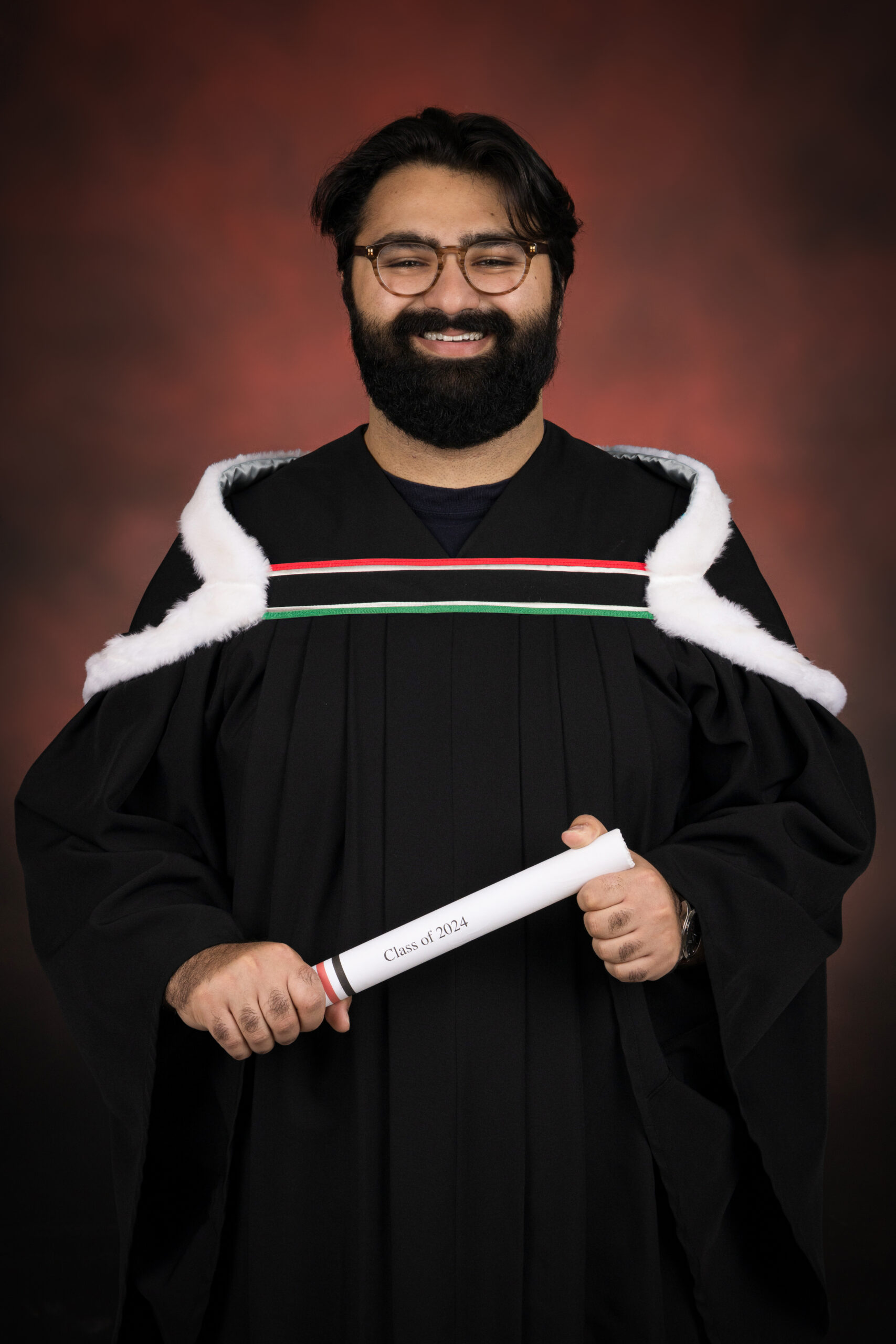In this special series of Q&As, McGill’s 2024 valedictorians share their insights and perspectives as they reflect on their academic journeys and look back at the moments that defined their time at McGill, from navigating the challenges of entering McGill during the COVID pandemic to finding and fostering a sense of community.
Today, we feature Nicolas Kamran, valedictorian for the Faculty of Law. Kamran, who has earned a BCL/JD, with a minor concentration in Philosophy, delivered his address at the Joint Law and Music ceremony on Wednesday, May 29, at 3 p.m.
Please note, the answers have been edited for brevity.
Why did you choose McGill?
What I knew about McGill was that it was a place where the study of pluralism was encouraged, where people from across the world gathered to talk about what it means to live together. This carried an immense appeal to me, and it still does.
What were some of your impressions when walking onto campus for the first time?
I have the strange but fortunate experience of being the son of a McGill professor, so my “first time” on campus was probably well before I knew how to walk. My earliest memories of Peel Street, the downtown campus, and even passing by the Faculty of Law, are all tethered to my father. Even now, I cannot enter McGill without getting the sense that I am walking into a place replete with people like him, people who care about sharing knowledge.
The first time I walked onto campus as a law student was at the outset of my second year. This was in Fall 2021, the time of our partial return to in-person learning. Without question, my first impressions were of those who surrounded me: my peers, all of whom were either taller or shorter than what Zoom allowed me to know, and, as I would come to learn, fascinating people.
 What are some of the highlights of your time as a McGill student?
What are some of the highlights of your time as a McGill student?
What comes to mind are those wonderful nights I spent getting to know my peers. Among the most special were the soirées de poésie put on by the Club de poésie et de botanique, where I watched my classmates bare their souls through verse. Many other nights were spent in the homes of friends. My peers have taught me so much about warmth and hospitality.
On a more academic level, I have been privileged to work closely with professors whose contributions I thought I would only ever get to admire at a distance.
What were some of the biggest challenges you faced during your time here?
The most considerable challenges I faced at McGill were broadly related to the COVID-19 pandemic. In this, I suspect that I share much with my graduating class. Yet I will resist the temptation to say that I “overcame” any of these challenges. If anything, I endured, and I owe this to the support of my peers.
I can say with absolute conviction that McGill Law students give each other the strength to carry on through difficult times. The spirit here is one of mutual aid: at a moment’s notice, the McGill Law student is willing to share their notes, outlines and stories with fellow classmates. We count upon each other; we give each other the chance to feel seen and heard. We have made it impossible to go through law school alone.
What’s next for you, both short and long term?
In the short term, I will be leaving Montreal to serve as a law clerk at the Federal Court of Canada. From there, my hope is to attend graduate school. My core aspiration has long been to pursue a career as a legal scholar, but I am open to whatever else life might have to offer. I love ideas, and I love writing.
How has McGill helped prepare you for your next chapter?
I learned here that an inquisitive spirit could only take me so far, and that honing this spirit through reflection and diligence would be the task of a lifetime. Part of the reason why I want to be a scholar is that I think universities are a wonderful place to carry out such a task. At its best, a university is a place that allows you to unearth ideas and lay bare the assumptions underlying the structures in which you live.
What advice do you have for students new to McGill?
Part of figuring out school is learning how to navigate things your own way. This does not mean you should ignore what others have to teach you; quite the contrary. What it means is that only you can ultimately decide who you want to be, and, at some point, you will need to know who exactly that is.
That said, I have one word of advice to offer new students: give yourself and others grace.
Though I maintain that only you can chart your course here at McGill, please remember the unchosen limits that mark our lives. Each of us is vulnerable to chance and cruelty and the vicissitudes of life. This fact should be a call for solidarity: we can neither predict nor avoid many of the harms that will befall us, but we are so bound up in each other’s humanity that we have no choice but to be there for one another if we hope to make it through.
